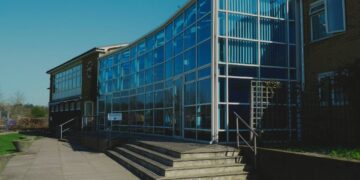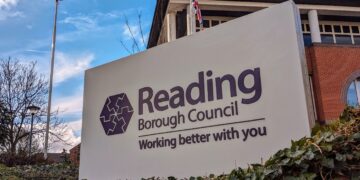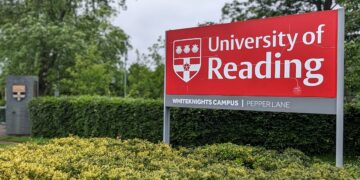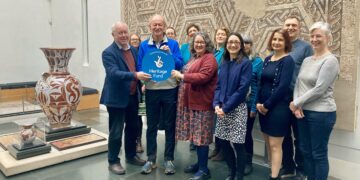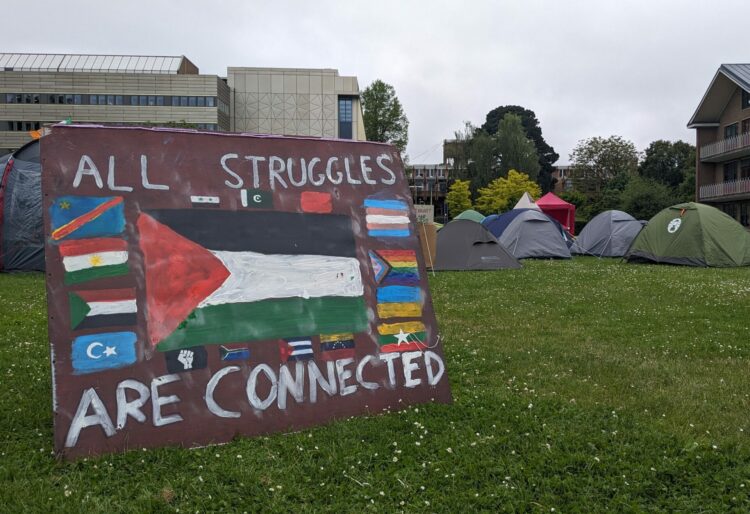STUDENTS in Reading have faced days of rain as they protest for more action on the continued conflict between Israel and Palestine.
They have staged an encampment at the University of Reading, urging the institution to cut ties with companies complicit with Israel’s attacks.
During the bank holiday weekend, the city of Rafah in southern Gaza has seen heavy bombardment by Israeli strikes, leaving dozens more people dead in the latest wave of violence.
Israel had designated the city a “safe zone,” leading thousands of Palestinians to take refuge there, including those who were staying in tents and camps, before the strikes.
Following the strikes, UN secretary general António Guterres said: “There is no safe place in Gaza – this horror must stop.”
Israeli officials have since pledged to continue the offensive on Rafah.
It follows months of intense bloodshed– this year has been the deadliest on record for Palestinians – as well as heavy blockades and restrictions which have continued to escalate.
Protests have sparked across the world in solidarity with the people of Palestine and to oppose Israeli offences which have been described as a genocide of innocent Palestinians.
These include encampments at universities such as Oxford, Toronto, and the Australian National University, all of whom have begun to take action against students.
Now a similar encampment has been set up at the University of Reading’s Whiteknights campus.
Tea Southwell is among the students taking part in the encampment, currently taking place outside the Palmer Building.
She said: “The Friends of Palestine Society had been planning a protest for quite a while, and we saw encampments across the UK and the states.
“We looked at the university’s investment portfolio and financial reports, published annually, and they featured companies which we view as being complicit with the genocide in Palestine.
“So we set up the encampment last Monday [May 20], and met with the vice chancellor on Friday.”
She explained that they are seeking action from the university to give more help to affected students and to end support for companies and organisations contributing to the attack on Palestine.
“We want the university to divest from those companies which are complicit, and especially from its support of Reichman University in Israel.
“[Reichman] have publicly said that they are helping with the ‘war’ effort– we don’t think that having ties with a university like that is okay.
“We also want to see the university condemn the ecological effects of the war, especially as it prides itself on being a green university.”
“We also want to see more help for students: we had the refugee scholarship scheme for Ukrainian asylum seekers.
“We have asked for the same for Palestinian students, and they have doubled the funding for the programme.
“However this is of no help to Palestinian students as they are unable to claim asylum in the UK.
“We also feel they should protect the right of students and staff to speak out on the issue, without fear of repercussions.”
Speaking of the public response, she said: “We’ve had such an amazing response from the local community; there are families nearby who take turns to bring us hot food each night, which has been really amazing.
“On Monday we ran an arts and crafts picnic, which saw lots of families and children come and take part, so the community has been incredible.”
The encampment is formed of a small group of tents, where students are staying day and night, bearing signs calling for the freedom of Palestine and its people and an “end to Israeli Apartheid.”
She explained: “It’s extremely important for students to take part in these protests, especially with a general election coming up– it’s a really key time.
“We saw Labour almost lose in the West Midlands mayoral elections due to a 20% vote-swing to an independent whose only policy was support for Palestine.
“It’s such an important issue, and none of the major parties, with the exception of the Green Party, is supporting Palestine in any meaningful way.”
She added: “Students have always been at the forefront of evolution, and while our encampment is small, we’ve made good progress in getting the university to meet our demands.
“If the university response to our demands, we hope that it can change the situation for other action around the country.”
The university’s student union released a statement on Monday, May 20, saying that it supported the encampment and asking the community to respect the students’ right to peaceful protest.
It explained: “As Reading Students’ Union, we fully support our students in using their voices to speak up on important global issues.
“This includes their right to freedom of speech and to peacefully protest on campus. We ask our community to do the same and to respect the rights of these students to demonstrate as they see fit.
“We are actively collaborating with the University to ensure ongoing, open communication with all students involved.
“Our goal is to do all we can to facilitate a productive and respectful conversation and to provide the necessary support for these students during their protest.”
On Friday, May 24, vice-chancellor Professor Robert Van de Noort released a statement, explaining: “In recent days, I have been in contact with students in the UoR Friends of Palestine society– some of whom have been protesting in the square outside the Palmer building on our Whiteknights campus.
“I met with a group of the students on Tuesday. We had a constructive and interesting discussion, in which they highlighted a number of concerns about the experience of Palestinian students in the UK, and at Reading specifically.
“I was impressed with their thoughtfulness, their intelligence, and the respectful tone of our conversation, and promised to respond within the week.”
He continued: “They have published their concerns, and the actions they would like the University to take.
“This includes the university taking a position on war crimes – particularly around the international law protecting the environment; divesting from companies involved in supporting Israel’s military; providing more assistance to Palestinian students fleeing conflict; and safeguarding freedom of speech on campus to allow students and staff to speak up without fear of repercussions.”
Speaking on the demands to take action, he explained: “The University itself provides the facilities and the space in which this discovery can take place, and ideas can be debated and contested.
“My job, and the role of the University, is to make these facilities work for everyone.
“By providing an environment for academics and students to do their research and study, we allow them to speak to all sides, to freely inquire, to respectfully disagree with each other, and contest different perspectives, and engage with all relevant groups.
“This is the best way for the University to support inquiry and dialogue, and the tolerance that an open society requires.”
He explained that taking an official stance on the conflict as an institution could hamper efforts to rebuild Gaza.
“In recent days, I have heard about the work of academics and students in Law, and Politics and International Relations, who have used their platform as independent experts to work towards the post-war reconstruction of Gaza, to hold alleged war criminals to account, and to help highlight and eliminate prejudice and racism.
“This work would be more difficult, or even impossible, if our University was to be seen to take an institutional position on international events.
“The University can and does also use its independent position to highlight this work.”
Speaking on demands for divestment from complicit companies, he said: “I wholeheartedly agree with the idea that the use of our assets should align with our broader University principles.
“I am confident that the University, after many years of strong leadership and careful thought on ethical investment, has an investment policy that matches our values.
“I have in recent days confirmed with colleagues in Finance that our policy specifically excludes investments in weapons and arms companies.
“We require our investment manager to screen out all corporations that are complicit in the violation of international law.
“This includes – but is not restricted to – those companies listed by the United Nations as involved in activities in settlements in the Occupied Palestinian Territories.”
The Vice-chancellor’s response has garnered some criticism from those taking part in the protest, citing a lack of action on the university’s part.
“The only real action the VC has pledged to make is to double the funding for the University asylum supporter scheme. This pledge, while commendable, means little for Palestinian students.
“Currently there is no formal process for Palestinian asylum seekers to obtain a visa to reside in the UK, unlike the visa scheme that was implemented for Ukrainian refugees.
Our demands to divest from companies complicit in the genocide, such as Barclays, were not met.
“The change we propose to the existing investment policy is for the exclusion criteria to include companies that, whilst themselves not in violation of the university’s investment policy, invest in companies that would breach the investment policy.
“This includes Barlcays PLC, who invest in both arms companies in contract with the Israeli government as well as harmful agri-buisnesses such as JBS S.A.”
They also cited a lack of action on partnerships with other educational institutions: “The university currently offers a study abroad program at Reichman University.
“This university is self-described as Zionist and proudly declares that they have ‘have mobilised to assist [in the war] in various capacities.'”
“This university surely does not align with the values of the University of Reading, and continuing to work with this institution is profoundly unethical.”
They also addressed the academic freedom of the university and its faculty, saying: “We consider the genocide in Gaza an unconscionable and indisputable act; whilst wanting to maintain academic freedom at the university is important, this should not extend to protecting the rights of staff to engage in misinformation.
“Condemning the actions of the Israeli government and military, if only the impact on the environment and education facilities in Gaza, should therefore have no negative effect on academic freedom.”
The statement released by Reading Students’ Union is available via: readingsu.co.uk
The vice-chancellor’s statement is available to read in full via: Reading.ac.uk

